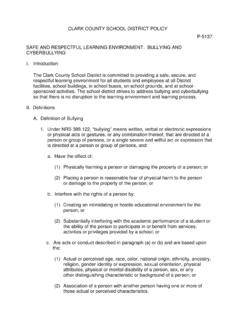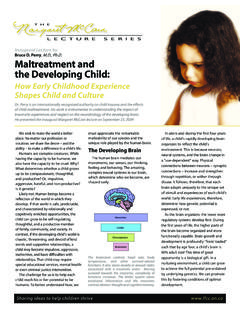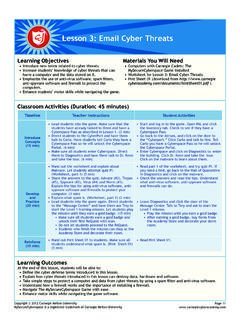Transcription of Policy & Procedures Manual
1 Policy and Procedures Manual Policy #3-06 Approved By: Education Council Approval Date: November 13, 2015 Revision Date: November 13, 2015 May 12, 2018 Effective Date: May 12, 2018 Date to be Reviewed: 2023 Administrator Responsible: Executive Vice President, Academic COMMUNITY CODE OF ACADEMIC, PERSONAL AND PROFESSIONAL CONDUCT (CODE OF CONDUCT) Policy STATEMENT North Island College is a vibrant community involved in teaching, learning , applied research, and other educational activities. The college is committed to fostering a culture of integrity, mutual respect, and responsible behaviours to provide a welcoming, safe, and inclusive environment for all. PURPOSE STATEMENT The purpose of this Policy is to describe the principles, definitions, expectations, and responsibilities that support a welcoming, safe and inclusive environment as they pertain to: Personal and professional conduct (See Procedures Appendix A) bullying and cyberbullying (See Procedures Appendix A) Violence against person or property or improper or illegitimate use of college property/equipment (See Procedures Appendix A) Smoking, consumption of alcohol or other substances that impact safety and/or behaviour (See Procedures Appendix A) Academic integrity (See Procedures Appendix B) SCOPE AND APPLICATION 1.
2 This Policy applies to all members of the college community. 2. This Policy relates to all forms of misconduct with the exception of those related to Human Rights (NIC Policy #2-08), and Sexual Violence and Misconduct (NIC Policy #3-34). 3. Events that occur on or off campus, or outside normal college business hours, and/or through social media and other digital mediums may be investigated if the parties are currently connected to each other through the college and if the alleged misconduct Community Code of Academic, Personal and Professional Conduct (Code of Conduct) Policy #3-06 2 creates an environment on campus for the participants that is not safe, secure and free from forms of misconduct. 4. This Policy will not limit or conflict with the rights as provided for in the college s Collective Agreements and Common Agreements or any person s rights under the NIC Policy #2-08 Human Rights. PRINCIPLES 1. This Policy will be in keeping with the Canadian Charter of Rights and Freedoms, BC Human Rights Code, BC Freedom of Information and Protection of Privacy Act, the Criminal Code of Canada, and BC s Workers Compensation Act.
3 2. To assure administrative and procedural fairness, the principles of natural justice will be the foundation for all investigations, decisions and outcomes. 3. The college will promote a culture that supports and facilitates the reporting of violations against this Policy . 4. The college will act quickly and reasonably to investigate all reports of misconduct. 5. The college will respond in a manner that is intended to minimize harm. 6. Where appropriate, restorative justice forums will be implemented to mitigate and repair harm. 7. The college s Human Rights Policy (#2-08) will further support a culture free from discrimination and harassment. DEFINITIONS: Academic Integrity Behaving with honesty and truthfulness in all work presented towards an academic credential, publishing, reporting of transcripts, and other academic-related activities. Academic Integrity Chair The chair role is to support the Academic Integrity Committee and to oversee the process outlined in the code of conduct as they relate to academic integrity.
4 Academic Integrity Committee This committee is normally comprised of at least five (5) faculty members from each decanal area/division appointed by the dean/director. There is no length of term, and members remain on the committee as determined by mutual agreement with the dean. Academic Integrity Panel This panel is comprised of three (3) faculty members who are external to the student s program area. Members are selected from the Academic Integrity Committee by the Academic Integrity Chair or designate. Community Code of Academic, Personal and Professional Conduct (Code of Conduct) Policy #3-06 3 bullying A form of harassment and a type of violence in the learning and workplace that can cause psychological and/or spiritual harm; interferes with one s right to a respectful work and learning environment. bullying does not include reasonable action taken by a supervisor or instructor relating to classroom management, teaching, campus events, or workplace activity. Cheating Includes but is not limited to: Copying, or allowing the copying of assignments, tests, exams, and other forms of academic evaluations; Using unauthorized devices of any sort when presenting work for evaluation, including, but not limited to, tests and exams; Using unauthorized information during any evaluation process; Obtaining or providing without authorization questions or answers relating to any examination or test prior to the test; Work that is submitted as one s own work but has been created through collaboration or editing by another person to the extent that it no longer reflects the submitter s knowledge and effort.
5 Communication of any kind either verbal or non-verbal with another student during an examination, quiz or test. College Community Employees and students of NIC as well as contractors and others who have committed to an agreement with the college to provide services or become learners. Controlled Substances Any substances listed under the Controlled Drugs and Substances Act, 1996, Cyberbullying Using social media and other forms of digital communication to bully and cause psychological and/or spiritual harm. Discrimination Unintentional or intentional unfair treatment as prohibited under the BC Human Rights Code and that has no job or course related justification and puts individuals or groups at a disadvantage. Evaluation Process This activity includes student evaluation (as per Policy #3-33) and the provision of grades and notations on transcripts. Fabrication Falsifying of findings and data Providing a bibliography/reference that includes sources not used in the associated documents Providing citations that are not from the sources provided Providing counterfeit or forged documents, including medical notes or credentials Community Code of Academic, Personal and Professional Conduct (Code of Conduct) Policy #3-06 4 Final Exam Test written at the end of the course, during the formal exam writing period or an evaluation or assignment that is used in lieu of the final written test.
6 Harassment Inappropriate conduct or comment by a NIC community member or visitor towards another person that the member ought to have known would cause that person to be humiliated or intimidated. Impersonation The taking of a test, examination, or other assessment for another person or having another person take a test, examination, or assessment on one s behalf. Misconduct Non-compliance with the NIC s expectations of respectful behaviours and/or violation of legislation, NIC s policies and/or collective agreements. Includes behaviours endangering the safety of persons and/or disrupting the teaching and learning environment. Notation on Student Record Notation on student record maintained by the associate vice-president, student services and registrar (not the transcript). Personal Conduct Conduct not determined by a professional body. Plagiarism Representing someone else s work, ideas, findings, facts, opinions, and/or theories as one s own, through improper and/or incomplete citation of work submitted.
7 Professional Conduct Appropriate conduct determined by professional organizations. Principles of Natural Justice include: a. Audi Alteram Partem listen to both sides - any person who is being accused of something has the right to know the accusation and must be given a reasonable opportunity to respond to the accusation, to offer rebuttals, and to provide counter evidence. b. Nemo Judex Rule Nemo Judex Rule no person shall be a judge in their own case, and every person has the right to an unbiased and independent decision maker. Procedural Fairness A term used alternatively with natural justice to describe process conditions that are fair, transparent and in compliance with audi alteram partem and nemo judex rules. Reprimand Normally a verbal warning regarding an unacceptable behavior. Community Code of Academic, Personal and Professional Conduct (Code of Conduct) Policy #3-06 5 Restorative Justice Forum An approach to justice designed to identify and address harm; it involves those responsible for the harm and the individuals and community impacted by it.
8 Risk Assessment and Prevention Team (RAPT) A team comprised of trained individuals who meet as required to investigate possible threats to the campus community. Student A person the associate vice-president, student services and registrar recognizes to be an active applicant or to be enrolled in a course or program of studies at the college. Student Case Management Team (SCMT) A team comprised of representatives who meet regularly to discuss concerning student behaviours and to develop supportive interventions. Support Person A person present at meetings or hearings. This person will not participate or provide comment during hearings and must not be in conflict of interest ( must not be a current instructor for the student in another course). Student Union Advocate A representative from the North Island Student Union who will provide assistance to students in addressing fairness issues and resolving disputes. This person will not participate or provide comment during hearings.
9 Suspension The removal of a student or employee from the college for period of time in accordance with the BC College and Institute Act. Teaching and learning Environment Any activity that is related to instructional activity and grading of a course. For example, classroom instruction, practical instruction, field trips, meeting with faculty regarding academic matters. Violence against persons Any behaviour causing risk to the physical, psychological and/or spiritual well-being of another person including but not limited to carrying weapons, uttering threats, assaults, abuse, and other forms of intimidation. Violence against property Includes damage to physical property belonging to the college or members of the community while on college property or during college functions. Visitors Persons outside of the college community who interact directly or indirectly with college members on campus or at college sanctioned events. Community Code of Academic, Personal and Professional Conduct (Code of Conduct) Policy #3-06 6 GUIDELINES Expectations and Responsibilities All members of the college community have the responsibility of creating a welcoming, safe, and inclusive environment.
10 As such, it is expected that all members will behave with integrity, honesty, and truthfulness and will behave towards each other with respect and courtesy. While this Policy applies to all members of the college community, responses to violations and reparations of harm must comply with collective agreements, NIC policies, and current legislation. Violations will be addressed through the sanctioning processes outlined in the appendices of this Policy with the intention of providing learning opportunities to avoid further transgressions. Communication and Education To ensure an understanding of the purpose and principles of this Policy , the college will regularly offer information to all members of the community through the college website and publications, faculty presentations to students, new employee documents, and educational sessions to employees. Communication of transgressions to appropriate college employees will occur in compliance with the BC Freedom of Information and Protection of Privacy Act.



